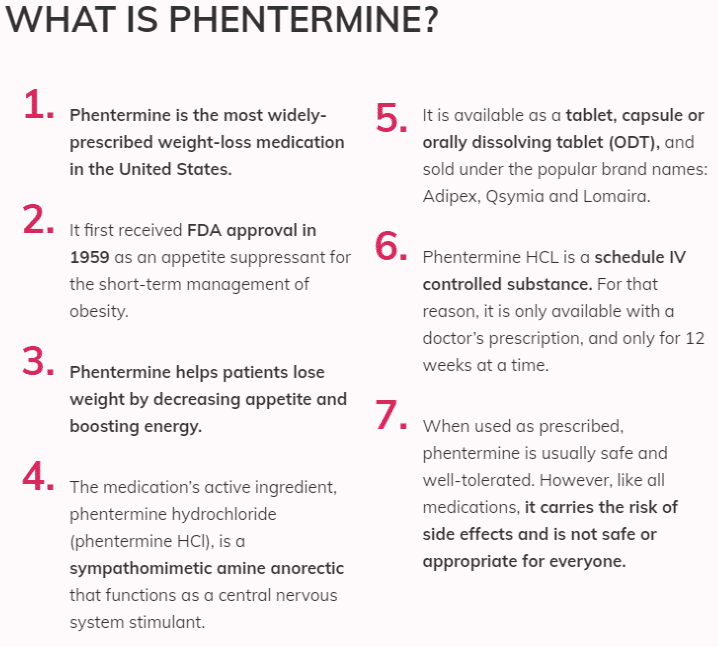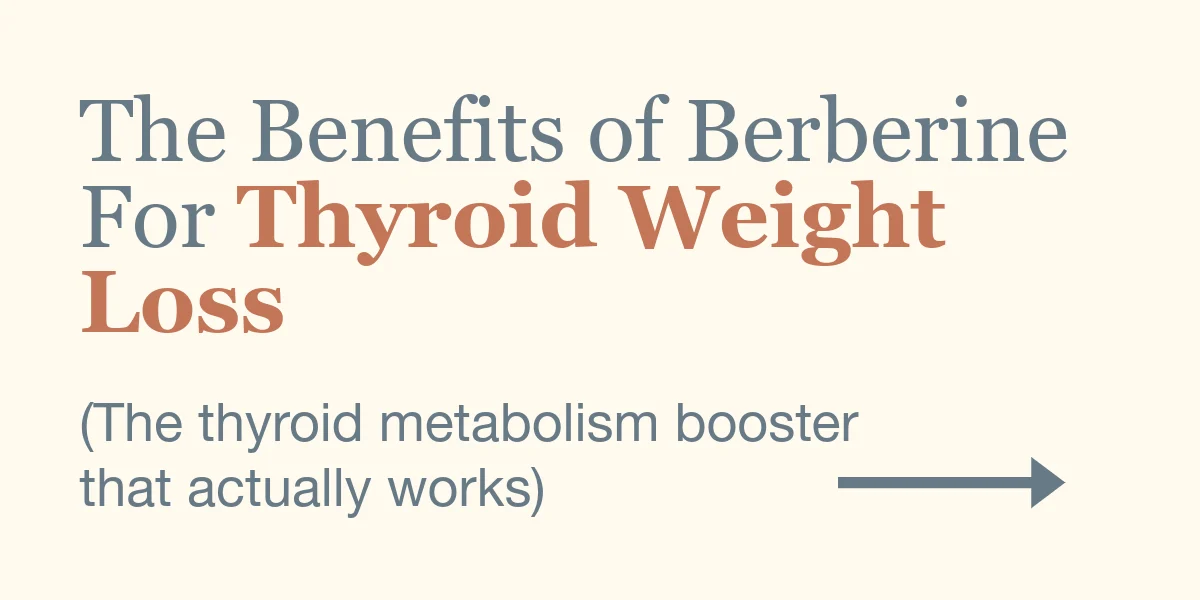Phentermine Helps with Weight Loss but Should you Use it?
Phentermine is one of the most common prescription weight loss medications used to help patients lose weight.
But if you are thinking about using Phentermine (or if you’ve used it before) you NEED to pay close attention to this article.
While Phentermine may help with weight loss, I am going to try and convince you that the side effects and trade-offs that come with this weight loss are NOT worth it.

In fact, there are many better and far more effective medications available to patients who are interested in medical weight loss that do not have the same side effects.
And when I refer to side effects here I am not talking about the side effects of the medication itself.
No, instead I am referring to the consequences that Phentermine has on your body.
These consequences tend to be long-lasting and can make your weight loss efforts significantly more difficult down the line.
Today you will learn…
- Why Phentermine is not a great weight loss medication
- Why the weight loss associated with Phentermine is almost always temporary
- How Phentermine can cause serious and long-term damage to your metabolism
- How Phentermine causes a drop in lean muscle mass and not fat mass
- And much more
Let’s jump in:
4 Big Reasons to Avoid Using Phentermine as Prescribed by Your Doctor
I know what you are probably thinking.
You’ve been struggling with weight loss for a long time, perhaps even years.
You’re fed up with trying to diet, eat healthily, and exercise, which doesn’t seem to work for you anyway.
Finally, you decide to go to your doctor to get some assistance with the use of medical drugs.
And you think that THIS will finally solve your problem.
I’ve gone some news for you:
It’s not quite that easy.
When I first started practicing medicine and focusing on weight loss, I was very excited to use Phentermine.
I thought I would be able to put people on Phentermine, help them lose weight, and call it a day.
Unfortunately, it didn’t quite work out that way.
While it did help some people lose a modest amount of weight, something like 3-5 pounds a month maybe.
I found that this weight pretty much ALWAYS came back.
Which defeated the purpose of weight loss.
And I soon found out there were many other issues as well.
#1. The Weight Loss from Phentermine is Almost Always Temporary
As I mentioned earlier, the weight loss associated with Phentermine use (1) is temporary.
While you are taking the medication you will experience a drop in your appetite and a slight boost to your metabolism.
These effects do work to help you lose some weight (provided your metabolism can handle it) but there’s one big problem…
As soon as you stop taking the medication and begin to eat normally, the weight comes right back on.
And what makes it worse is that Phentermine is NOT intended to be used as a long-term medication.
You can really only use it for 2-3 months at a time at which point you need to give your body a break.
Yes, you may lose 5-15 pounds during the 2-3 months that you take Phentermine but that weight will come back 99% of the time within another 3-6 months.
And what good is losing weight if it comes right back?
Not much at all.
In fact, this sort of weight loss is referred to as yo-yo dieting (yes, even if it comes secondary to the use of prescription medication) and can cause some serious long-term problems.
#2. Using Phentermine Daily Can and Dose Cause Metabolic Damage
Perhaps the single biggest reason to avoid using Phentermine is that it can cause something called metabolic damage.
Not familiar with metabolic damage, don’t worry, I’ll fill you in.
Metabolic damage is another way to describe a response that your body undergoes when it is subjected to a reduction in calories.
In the medical world, this phenomenon is referred to as metabolic adaptation (2).
I prefer the word metabolic damage because it’s much easier for people to understand.
Metabolic damage is understood as damage to your metabolism.
And this is a HUGE problem.
Let me explain how it works.
Whenever you consciously (or not) reduce the number of calories that you consume on a daily basis your metabolism will drop to match that intake of calories.
Because Phentermine causes appetite suppression, patients who use it will naturally consume fewer calories each and every day.
This reduction in calories (if it persists for longer than 20 consecutive days) will result in a drop in your metabolism.
But here’s the kicker:

This drop in metabolism persists for a LONG time even after you start eating normally again.
And it is this drop in metabolism which causes you to gain weight once you stop taking the medication.
Consider this scenario to let it sink in:
Imagine for a minute that you are someone who burns 2,000 calories per day and you are currently 180 pounds.
You go on Phentermine daily for 2-3 months which causes you to naturally reduce your calories down to 1,800 per day.
This creates a 10% penalty on your metabolism (in the form of metabolic damage) which cuts your metabolism down from 2,000 calories per day to 1,800 calories per day.
This works fine while your calories are cut but what happens when you stop taking Phentermine (remember, you CAN’T take it forever)?
You start to consume 2,000 calories per day normally even though your body is now burning 1,800 calories every day.
You are now in a +200 calorie surplus which will cause your body to gain weight.
Can’t you just keep your calories low to prevent you from gaining that weight?
Well, yes, but you will be hungry each and every day so it isn’t a long-term solution.
#3. Phentermine May Cause a Drop in Lean Muscle Mass
Let’s go back to the weight loss aspect for a minute.
Remember when I said that Phentermine could help you lose weight?
Well, that much is true, but what I didn’t tell you is what type of weight you will lose.
When people try to lose weight they often focus on the wrong metrics.
They tend to hyper-focus on the scale and whatever number pops up when they stand on it.
But what you may not realize is that measuring your weight loss with a scale is probably the worst way to do it.
Your goal, when you try to lose weight, is to lose FAT mass.
But MANY weight loss therapies, including Phentermine, do not always cause a loss in fat mass.
Instead, they may cause you to lose MUSCLE mass (3).
So when you hop on the scale to measure your weight you may see a drop there but that’s not the whole story.
What you don’t realize is the weight that you lost wasn’t from your fat stores but from your muscle stores.
Muscle mass is incredibly important when it comes to managing your weight because it feeds back into your metabolism.
If your muscle mass drops you will see a corresponding drop in your metabolic rate.
Again, this is absolutely something that you don’t want to happen but it’s something that can and often does occur when using Phentermine.
As you reduce your calories, your muscles may not get the nutrients and calories that they need to thrive.
This will cause them to shrink and you to lose some portion of your muscle mass.
Your goal should be to lose FAT mass and GAIN muscle mass and let the scale say whatever it says in the process.
#4. Phentermine Can Cause Serious Side Effects
Lastly, Phentermine is not without side effects.
I’m actually a huge fan of trading temporary side effects for lasting weight loss, even if those side effects are unpleasant.
Why?
Because the pros vastly outweigh the cons.
If you can permanently lose 20-30 pounds at the expense of some side effects from prescription medications for 3-6 months you will be doing a great service for your overall health.
A drop in your weight (and fat mass) will reduce your risk of diabetes, heart disease, cancer, high blood pressure, high cholesterol, hormone imbalance, and so on.
But this assumes that the weight that you lose IS in fact permanent or long-lasting.
Trading serious side effects for temporary weight loss which will eventually come back in a few months is absolutely not worth it.
And this is where Phentermine fits in.
Why would you trade significant side effects for temporary weight loss? It doesn’t make any sense.
What side effects (4) am I talking about?
Phentermine has been known to cause any or all of the following:
- An increase in blood pressure
- Heart palpitations
- Insomnia
- Dry mouth
- Constipation
- Anxiety
It’s Not All Bad News
I just spent the last few minutes explaining to you why you shouldn’t use Phentermine for weight loss.
I’m now going to spend some time trying to convince you why it isn’t all bad news and Phentermine still has a place in the medical management of weight loss.
It turns out that there is still a way to use Phentermine in a beneficial way that allows you to take advantage of its effects without all of the negative downsides which come along with it.
The key to using it in this way is to throw out all you know about how it is regularly prescribed.
The standard way of using Phentermine is to take it each and every day for a few months without any breaks.
But you don’t HAVE to use it in this way.
In fact, I’ve found significantly more success in using a different model.
My model allows you to use Phentermine but only a few days each week and during prolonged or intermittent fasts.
Using it this way you won’t cause the metabolic damage associated with daily use and can minimize side effects since you can use a lower dose.
If you are interested in learning more about this method then check out this article which explains it in more detail.
The Bottom Line
While it may be tempting to run to your doctor to get a prescription of Phentermine to help with weight loss, I would strongly caution against this approach.
There is no one magic pill for weight loss and this includes prescription medications.
When you look at the consequences of Phentermine use and what it does to your body long-term, I think you will agree that the small benefit is not worth it.
But now I want to hear from you:
Have you used Phentermine in the past?
Did you have success with it?
Did your weight come back once you stopped taking it?
Were you aware that there is a new and better way to use it?
Leave your questions or comments below!









